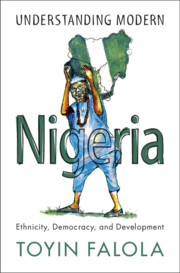Book contents
- Understanding Modern Nigeria
- Understanding Modern Nigeria
- Copyright page
- Dedication
- Contents
- Figures
- Maps
- Preface
- Acknowledgments
- Part I Introduction
- Part II Context and History
- Part III Democracy and Governance
- Part IV Development Crises
- 11 Corruption
- 12 The Political Economy of Oil
- 13 Environment and Sustainable Development
- 14 Food, Society, and Human Capabilities
- 15 Women’s Marginalization
- 16 Human and Minority Rights
- 17 Political Violence
- 18 Challenges of Western Education
- Part V Reforms and Revolutions
- Part VI Conclusion
- Bibliography
- Index
12 - The Political Economy of Oil
from Part IV - Development Crises
Published online by Cambridge University Press: 09 June 2021
- Understanding Modern Nigeria
- Understanding Modern Nigeria
- Copyright page
- Dedication
- Contents
- Figures
- Maps
- Preface
- Acknowledgments
- Part I Introduction
- Part II Context and History
- Part III Democracy and Governance
- Part IV Development Crises
- 11 Corruption
- 12 The Political Economy of Oil
- 13 Environment and Sustainable Development
- 14 Food, Society, and Human Capabilities
- 15 Women’s Marginalization
- 16 Human and Minority Rights
- 17 Political Violence
- 18 Challenges of Western Education
- Part V Reforms and Revolutions
- Part VI Conclusion
- Bibliography
- Index
Summary
“The Political Economy of Oil” examines the vital role petroleum oil plays in the sociopolitical and economic formation and sustenance of Nigeria, highlighting its paradoxical nuances. The oil produced in the Niger Delta contributes immensely to the nation’s GDP yet has caused so much underdevelopment and destruction. While the oil produced is a mechanism of state cohesion, it is also a cause of division; the Niger Delta society suffers the untoward extraction and exploitation of the petroleum resource. Therefore, individuals and groups in the Niger Delta states have consistently positioned themselves to be both a threat to stability and an asset for securing peace in a constantly shifting terrain. The dependency has created a rentier state in which all problems are resolved through a patronage network funded by crude oil. Maintaining this network and diversifying the country’s economy are opposing goals. A seismic shift is required in the state’s sociopolitical calibration to stem the tide that is drowning individual and collective efforts to change the economic realities and social narratives that are weighing down the region. As this undisputable issue continues to linger in Nigeria, it requires a careful observation and analysis of nuanced issues to be fully understood.
Keywords
- Type
- Chapter
- Information
- Understanding Modern NigeriaEthnicity, Democracy, and Development, pp. 285 - 313Publisher: Cambridge University PressPrint publication year: 2021



